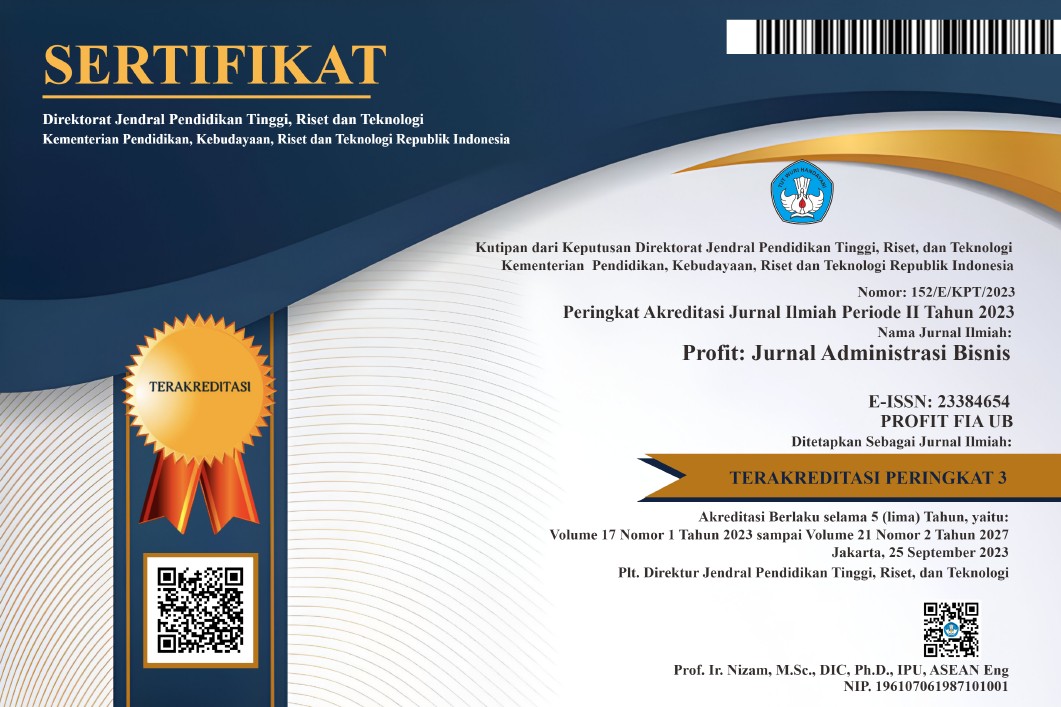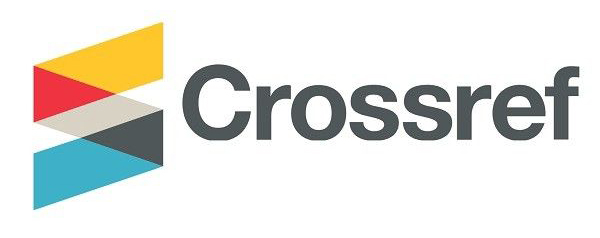How Social Media Impacts on Customer Brand Engagement, Brand Trust and Brand Loyalty
DOI:
https://doi.org/10.21776/ub.profit.2024.018.01.2Keywords:
social media marketing activities; customer brand engagement; brand trust; brand loyalty; masstige brandAbstract
This research analyzes the effect of Social Media Marketing Activities, Customer Brand Engagement, and Brand Trust on Brand Loyalty. Currently, coffee drinks and activities have become a trend for the community. Starbucks, the world's largest coffee shop company, was born with a luxurious image. By demographic class, the Starbucks customer segment is middle to upper class, classified as a masstige brand. The masstige brand position is between the upper mid-level and super premium courses. Business competition for masstige brands is more sophisticated and global, which expedites adapting communication technology to build brand loyalty. Social media marketing activities reinforce brand loyalty through customer engagement to improve customer relations. Even the transfer of information between brands to customers through social media has the potential to boost brand trust. The research method used is quantitative. This research questionnaire was distributed online to 210 customers of the masstige brand Starbucks in three major cities in East Java Province. The data were analyzed using PLS. This study's results show that the 5 hypotheses significantly affect the dependent variable. It indicates that implementing Social Media Marketing Activities, CBE, and BT strategies can improve BL on customers of masstige brand Starbucks.
References
Algharabat, R., Rana, N. P., Alalwan, A. A., Baabdullah, A., & Gupta, A. (2020). Investigating the antecedents of customer brand engagement and consumer-based brand equity in social media. http://hdl.handle.net/10454/17464
Algharabat, R. S. (2017). Linking social media marketing activities with brand love: The mediating role of self-expressive brands. Kybernetes, 46(10), 1801–1819. https://doi.org/10.1108/K-04-2017-0130
Althuwaini, S. (2022). The Effect of Social Media Activities on Brand Loyalty for Banks: The Role of Brand Trust. Administrative Sciences, 12(4). https://doi.org/10.3390/admsci12040148
Ashley, C., & Tuten, T. (2015). Creative Strategies in Social Media Marketing: An Exploratory Study of Branded Social Content and Consumer Engagement. Psychology and Marketing, 32(1), 15–27. https://doi.org/10.1002/mar.20761
Cheung, M. L., Pires, G. D., & Rosenberger, P. J. (2021). Exploring consumer–brand engagement: a holistic framework. European Business Review, 33(1).
https://doi.org/10.1108/EBR-10-2019-0256
Cheung, M. L., Pires, G., Rosenberger, P. J., & De Oliveira, M. J. (2020). Driving consumer–brand engagement and co-creation by brand interactivity. Marketing Intelligence and Planning, 38(4), 523–541. https://doi.org/10.1108/MIP-12-2018-0587
Cooper, D. R., & Schindler, P. (2014). Business research methods. Mcgraw-hill.
Ebrahim, R. S. (2020). The Role of Trust in Understanding the Impact of Social Media Marketing on Brand Equity and Brand Loyalty. Journal of Relationship Marketing, 19(4), 287–308. https://doi.org/10.1080/15332667.2019.1705742
Fetais, A. H., Algharabat, R. S., Aljafari, A., & Rana, N. P. (2022). Do Social Media Marketing Activities Improve Brand Loyalty? An Empirical Study on Luxury Fashion Brands. Information Systems Frontiers. https://doi.org/10.1007/s10796-022-10264-7
Fournier, S. (1998). Consumers and their brands: Developing relationship theory in consumer research. Journal of consumer research, 24(4), 343-373.
Foxall, G. R. (2001). Foundations of consumer behaviour analysis (Vol. 1, Issue 2).
Goyal, A. (2021). Consumer Perceived Associations of Masstige Brands: An Indian Perspective. Journal of Promotion Management.
Hair, J. (2010). Multivariate Data Analysis 7 th. Prentice-Hall.
Haskova, K. (2015). Starbucks Marketing Analysis. CRIS - Bulletin of the Centre for Research and Interdisciplinary Study, 2015(1), 11–29. https://doi.org/10.1515/cris-2015-0002
Hollebeek, L. D., Glynn, M. S., & Brodie, R. J. (2014). Consumer brand engagement in social media: Conceptualization, scale development and validation. Journal of interactive marketing, 28(2), 149-165.
Ghozali, I (2014). Structural Equation Modeling, Metode Alternatif dengan Partial Least Square (PLS) (4th ed.). Semarang: Badan Penerbit Universitas Diponegoro.
Ibrahim, B. (2021). The nexus between social media marketing activities and brand loyalty in hotel facebook pages: A multi-group analysis of hotel ratings. In Tourism (Vol. 69, Issue 2, pp. 228–245). Institute for Tourism. https://doi.org/10.37741/T.69.2.5
Ibrahim, B. (2022). Social Media Marketing Activities and Brand Loyalty: A Meta-Analysis Examination. Journal of Promotion Management, 28(1), 60–90. https://doi.org/10.1080/10496491.2021.1955080
Ibrahim, B., & Aljarah, A. (2018). Dataset of relationships among social media marketing activities, brand loyalty, revisit intention. Evidence from the hospitality industry in Northern Cyprus. Data in Brief, 21, 1823–1828. https://doi.org/10.1016/j.dib.2018.11.024
Ibrahim, B., Aljarah, A., & Sawaftah, D. (2021). Linking social media marketing activities to revisit intention through brand trust and brand loyalty on the coffee shop facebook pages: Exploring sequential mediation mechanism. Sustainability (Switzerland), 13(4), 1–16. https://doi.org/10.3390/su13042277
Khan, I., Fatma, M., Kumar, V., & Amoroso, S. (2021). Do experience and engagement matter to millennial consumers? Marketing Intelligence and Planning, 39(2), 329–341. https://doi.org/10.1108/MIP-01-2020-0033
Khong, K. W., Onyemeh, N. C., & Chong, A. Y. L. (2013). BSEM estimation of network effect and customer orientation empowerment on trust in social media and network environment. Expert Systems with Applications, 40(12), 4858-4870.
Kim, A. J., & Ko, E. (2012). Do social media marketing activities enhance customer equity? An empirical study of luxury fashion brand. Journal of Business Research, 65(10), 1480–1486. https://doi.org/10.1016/j.jbusres.2011.10.014
Kotler, P., & Armstrong, G. (2016). Principles of Marketing sixteenth edition.
Kotler, K. (2009). Manajemen Pemasaran: Vol. Jilid I (Edisi ke 13). Erlangga.
Kotler, P. (1988). Marketing Management – Analysis, Planning, Implementation, and Control (6th ed.). Prentice Hall.
Kotler, P., & Zaltman, G. (1971). Social marketing: an approach to planned social change. The Journal of Marketing, 35(3).
Kumar, A., Paul, J., & Unnithan, A. B. (2020). ‘Masstige’ marketing: A review, synthesis and research agenda. Journal of Business Research, 113, 384–398. https://doi.org/10.1016/j.jbusres.2019.09.030
Lamkadem, S. A., & Ouiddad, S. (2021). Towards creating an effective customer brand engagement through social media marketing: A model proposal. International Journal of Business and Management Invention (IJBMI) ISSN, 10, 28–36. https://doi.org/10.35629/8028-1004012836
Lau, G. T., & Lee, S. H. (1999). Consumers' trust in a brand and the link to brand loyalty. Journal of Market-Focused Management, 4, 341-370.
Leon G. Schiffman, L. L. K. (2009). Consumer Behavior. Pearson Education.
Park, J. S., & Ha, S. (2021). Developing brand loyalty through consumer engagement with brand communities in social media. Asian Journal of Business Research, 11(1). https://doi.org/10.14707/ajbr.210100
Paul, J. (2019). Masstige model and measure for brand management. European Management Journal, 37(3), 299–312. https://doi.org/10.1016/j.emj.2018.07.003
Richard L Oliver. (1999). Whence Consumer Loyalty? Journal of Marketing .
Robertson, J., Botha, E., Ferreira, C., & Pitt, L. (2022). How deep is your love? The brand love-loyalty matrix in consumer-brand relationships. Journal of Business Research, 149, 651–662. https://doi.org/10.1016/j.jbusres.2022.05.058
Schiffman, L. G., & Cohn, D. Y. (2009). Are they playing by the same rules? A consumer gifting classification of marital dyads. Journal of Business Research, 62(11), 1054-1062.
So, K. K. F., King, C., & Sparks, B. (2014). Customer engagement with tourism brands: Scale development and validation. Journal of Hospitality & Tourism Research, 38(3), 304-329.
Sohail, M. S., Hasan, M., & Sohail, A. F. (2019). The Impact of Social Media Marketing on Brand Trust and Brand Loyalty. International Journal of Online Marketing, 10(1), 15–31. https://doi.org/10.4018/ijom.2020010102
Tarabieh, S. M. Z. A. (2022). The Impact of Social-media Marketing Activities on Consumers’ Loyalty Intentions: The Mediating Roles of Brand Awareness, Consumer Brand Engagement and Brand Image. Jordan Journal of Business Administration, 18(4), 477–499. https://doi.org/10.35516/jjba.v18i4.455
Tatar, Ş. B., & Eren-Erdoğmuş, İ. (2016). The effect of social media marketing on brand trust and brand loyalty for hotels. Information Technology and Tourism, 16(3), 249–263. https://doi.org/10.1007/s40558-015-0048-6
Yadav, M., & Rahman, Z. (2017). Measuring consumer perception of social media marketing activities in e-commerce industry: Scale development & validation. Telematics and Informatics, 34(7), 1294–1307. https://doi.org/10.1016/j.tele.2017.06.001
Downloads
Published
Issue
Section
License
Copyright (c) 2024 PROFIT: JURNAL ADMINISTRASI BISNIS

This work is licensed under a Creative Commons Attribution-NonCommercial 4.0 International License.
The copyright of the received article shall be assigned to the journal as the publisher of the journal. The intended copyright includes the right to publish the article in various forms (including reprints). The journal maintains the publishing rights to the published articles.

This work is licensed under a
Creative Commons Attribution-NonCommercial 4.0 International License

















